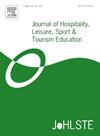Comparative analysis of National Student Survey responses: Exploring the perspectives and feedback of undergraduate sport students
IF 4.1
2区 教育学
Q1 EDUCATION & EDUCATIONAL RESEARCH
Journal of Hospitality Leisure Sport & Tourism Education
Pub Date : 2025-03-22
DOI:10.1016/j.jhlste.2025.100550
引用次数: 0
Abstract
Introduction
Higher education is constantly evolving to meet the demands of education, industry, and student's needs. Despite the ever-changing landscape, limited literature has investigated the changes which occur as students develop from the onset (Level 4) to the end (Level 6) of their undergraduate studies. Aim: To investigate the experiences and perceptions of students enrolled on sports-based undergraduate degree programmes at a UK-based Higher Education Institution (HEI).
Method
A total of 261 students responded to the National Student Survey (NSS), consisting of Sports Therapy (ST, n = 93, 35.5 %), Sports Coaching and Management (SCM, n = 91, 34.7 %), and Sport and Exercise Science students (SES, n = 77, 29.8 %). The cohort was then analysed by year group (Level 4 (n = 105, 40 %), Level 5 (n = 88, 33.6 %), and Level 6 (n = 69, 26.3 %).
Results
Significant differences were observed for Assessment and Feedback, Student Voice, and Overall Course Satisfaction (p ≤ 0.05). Pairwise comparisons revealed Level 4 students had significantly higher satisfaction when compared against Levels 5 and 6 for the sub-sections (p ≤ 0.001 to 0.032), however, no differences were observed between Levels 5 and 6 throughout. Qualitative responses alluded to the rationale behind significant differences for each sub-section and question, such as assessment rubrics and audio feedback.
Conclusion
One aim of the NSS survey is to provide data that supports universities to improve the student experience. Whilst the large number of respondents (<340,000 in 2023) translates to a highly reliable tool for gathering large quantities of information, this information is arguably given without deeper consideration of the many factors that may influence the student's responses. Herein, the potential value in investigating individual degree programmes more closely and of considering any differences between year-groups is highlighted. The utility of adding a qualitative element to better establish the reasoning behind each survey answer is also discussed. Collectively, this may drive a feedback mechanism that can allow students and HEI's to derive more informative outcomes and better decision making thereafter.
全国大学生问卷调查的比较分析:探讨体育本科学生的观点与反馈
高等教育不断发展,以满足教育、行业和学生的需求。尽管环境不断变化,但有限的文献调查了学生从本科学习开始(4级)到结束(6级)期间发生的变化。目的:调查在英国高等教育机构(HEI)注册体育本科学位课程的学生的经历和看法。方法共有261名学生参与了全国学生调查(NSS),包括运动治疗(ST, n = 93, 35.5%)、运动教练与管理(SCM, n = 91, 34.7%)和运动与运动科学(SES, n = 77, 29.8%)。然后按年级组(第4级(n = 105,40 %)、第5级(n = 88, 33.6%)和第6级(n = 69, 26.3%)对队列进行分析。结果两组在评估与反馈、学生声音、总体课程满意度方面差异有统计学意义(p≤0.05)。两两比较显示,与第5级和第6级学生相比,第4级学生的满意度显著更高(p≤0.001至0.032),然而,第5级和第6级之间没有观察到差异。定性回答暗指每个小节和问题的重大差异背后的理由,例如评估标准和音频反馈。NSS调查的目的之一是提供支持大学改善学生体验的数据。虽然大量的受访者(2023年为34万)转化为收集大量信息的高度可靠的工具,但可以说,这些信息是在没有深入考虑可能影响学生反应的许多因素的情况下给出的。在此,强调了更密切地调查个别学位课程和考虑年级组之间的任何差异的潜在价值。本文还讨论了添加定性元素以更好地建立每个调查答案背后的推理的效用。总的来说,这可能会推动一种反馈机制,使学生和高等教育机构能够获得更多信息的结果,并在此之后做出更好的决策。
本文章由计算机程序翻译,如有差异,请以英文原文为准。
求助全文
约1分钟内获得全文
求助全文
来源期刊
CiteScore
8.10
自引率
10.80%
发文量
41
审稿时长
42 days
期刊介绍:
The Journal of Hospitality, Leisure, Sport and Tourism Education (JoHLSTE) is the leading international, peer-reviewed educational journal for this subject grouping. Its aims are to: a) Promote, enhance and disseminate research, good practice and innovation in all aspects of higher education in Hospitality, Leisure, Sport and Tourism and Events to its prime audience including teachers, researchers, employers, and policy makers. b) Encourage greater understanding, links and collaboration across its constituent fields. JoHLSTE is designed to have maximum impact through it being available on-line, fully archived and peer-reviewed. JoHLSTE is divided into seven sections: Editorial; Academic Papers; Practice Papers, Perspectives, Comments and Rejoinders, Research Notes and Reports and Education Resource Reviews.

 求助内容:
求助内容: 应助结果提醒方式:
应助结果提醒方式:


